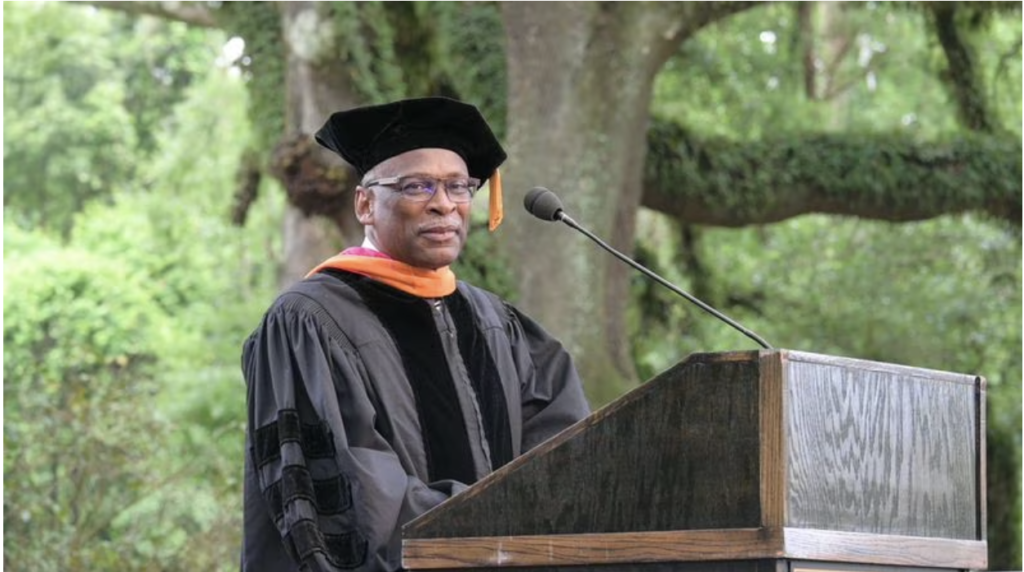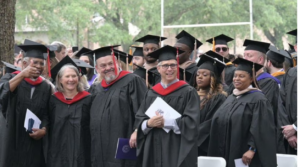Article by John Sharp for AL.com

Spring Hill College Graduation
Filtering through misinformation, pushing back against book bans, and being “woke,” were among the charged cultural and topical issues Alabama native and Super Soaker inventor Lonnie Johnson warned against Saturday during a commencement address at Spring Hill College.
Johnson, an Atlanta scientist and engineer and accomplished inventor who holds over 140 patents, urged students to use “common sense” while judging whether the news they are consuming is “true information or not.” He urged students to be “aware, awake and not asleep” – or “woke” – at a time when technological innovations like artificial intelligence advance at rapid speeds.
Johnson’s commencement speech was the second in as many days. He delivered a similar speech Friday before graduates at several schools affiliated with the University of South Alabama.
At Spring Hill College, he spoke before a graduating class of 297 students who took the traditional walk down the Avenue of Oaks, a picturesque half-mile-long lane that includes approximately 50 evenly spaced live oak trees. The lane has served as the home for the college’s graduation ceremonies since 1949.
“We live in the most prosperous time in human history and are surrounded by wealth and abundance yet we seek to be fighting each other and selectively removing books from schools,” Johnson said, taking a shot at an issue spurred on by courthouses and statehouses in mostly Republican-led states like Alabama.
“It seems like the books being removed have to do with the history of Black people in America,” Johnson said. “It’s branded as critical race theory and it’s lumped in as something evil and bad. How can we leave an important part of history out like it didn’t happen?”
Book bans have been on the rise this year. According to a report last month from PEN American, a nonprofit free speech organization, there were 1,477 instances of books being prohibited during the first half of the 2022-23 academic year, up from 28.5% from the previous semester.
There has been pushback, including from activists like 100-year-old Grace Linn, who spoke in protest against a Martin County, Florida, school board decision to purge over 80 books from school libraries.
Johnson quoted Linn during his speech and noted her comparison of book bans with the Nazi’s efforts to burn books during World War II, calling both a “fear of knowledge.” Linn’s husband was killed in action during World War II, and she told the Martin County school board that a book ban is an affront of the First Amendment, Johnson noted.
“Where does it stop?” he said. “Do we take out references to the two atomic bombs the U.S. dropped on Japan or references to World War II? What about knowing what was done in the past, so we don’t repeat those terrible things? We’re trying to dumb down education at a period of time when we are struggling with relationships and who we are.”
Johnson noted that as those social struggles continue, “technology is moving forward” as A.I. technologies are “able to solve problems faster than we can.” He said the ongoing technological activity is not going to slow down, and that “we are fighting each other because we are finding the best paths forward.”
“You have to have knowledge … woke, not asleep. Whatever. Not aware. Don’t burn books,” said Johnson. “If you do, the computer might know more than you do. And those burning books today, will they be burning computers tomorrow? Will we slip back into the past of distrust and conspiracy?”
He added, “Humans are built to move forward. We are problem solvers. We have always been fixers of things.”
‘Perseverance’
Johnson, whose Super Soaker creation is considered one of the best toys of the 20th century, continues to move forward with his work. His rechargeable battery technology aims to revolutionize the electric vehicle industry, focusing on sustainable energy solutions and reducing dependance on fossil fuels.
He also said he continues work on developing a device that converts heat into electricity, a process which he said his team is “in the process of doing a large demonstration project” on.
